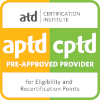Product Details
Topics Covered
- Career development programs
- Human capital
- Herzberg's Two Factor Theory
- Maslow's Hierarchy of Needs
- McClelland's Theory of Acquired Needs
- Expectancy Theory
- Leadership styles
- Career life cycle
- Career development tools
- Training vs. development
- Patents
- Copyright
- ADDIE
- Training needs analysis (TNA)
- Kirkpatrick's Method of Evaluating Training Programs
- Career development issues
Key Features
- Mobile-friendly
- Audio-enabled
- Badge and credit-awarding
- Real-world case studies
- Fully accessible
- Games & Flashcards
- Expert-supported
- Video content
Course Preview
Course Description
Learning Outcomes
- Understand and effectively communicate the value of a career development program
- Describe the five stages in the career life cycle
- Outline the tools for career development
- Understand the issues HR departments face with career management
- Evaluate employee skill gaps as part of a training needs analysis
- Understand the various types of job training and the strengths and weaknesses of each
- Understand the circumstances that call for managerial coaching and apply it effectively
- Apply knowledge of leadership styles and management techniques to leadership development
Notes
This course has an "Ask the Expert" feature, which submits your questions directly to an expert in the field you are studying. Questions are answered as quickly as possible and usually within 24 hours.
As an Accredited Provider, MindEdge offers for its learning events that comply with the Continuing Education and Training Standard.
Learners must achieve an average test score of at least 70% to meet the minimum successful completion requirement and qualify to receive credit. Learners will have three attempts at all graded assessments.



